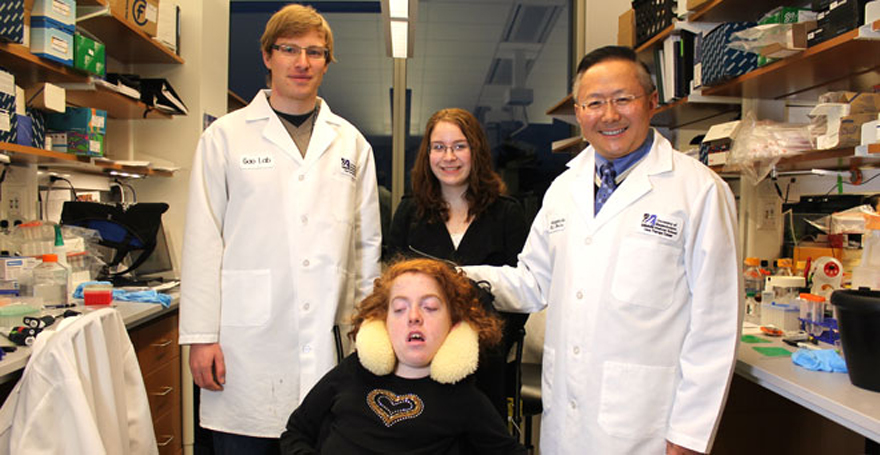GM2, GM1 Gene Therapy Programs Licensed
- Details
-
Last Updated: Wednesday, 19 December 2018 15:24
Last month we shared the exciting news from UMass Medical School (UMMS) about a significant grant that they received to advance the work of the Tay-Sachs Gene Therapy Consortium (TSGT).
There is another significant announcement that Axovant Sciences, Inc. announced they are licensing the GM1 and GM2 gene therapy programs from UMMS.
Read Axovant’s press release here.
Why is this fantastic news?
Axovant has the expertise, experience, and financial resources to partner with UMMS and NIH to implement the clinical trials, work with the regulatory authorities, and hopefully, if successful, make the gene therapy available more broadly.
We are thrilled to learn that Axovant will lead the development for the GM2 and GM1 gene therapy programs. NTSAD looks forward to helping them move forward as the leading patient advocacy group for Tay-Sachs, Sandhoff and GM1 diseases.
We want to acknowledge the significant role of the Cure Tay-Sachs Foundation as an equal funding partner along with NTSAD over the years, and the Blu Genes Foundation for their most recent major gift to the UMass Medical School gene therapy research.
We particularly want to acknowledge the work of Doug Martin, PhD, of Auburn University, who worked closely with Miguel Sena-Esteves, PhD, Heather Gray Edwards, PhD, and the team at UMass Medical School. The research results in the animal models, which Doug led at Auburn, provided essential validation of the results for these gene therapy programs.
We are grateful for everyone's passion and commitment over the last 11 years. It takes a village - a mighty and rare community to move mountains. And we're almost there.
Since 2007, over $2 million of Research Initiative gifts we've received from you have gone to fund the work of the Tay-Sachs Gene Therapy Consortium (Miguel Sena-Esteves, PhD, Doug Martin, PhD, Heather Gray-Edwards, PhD, Florian Eichler, MD, Professor Tim Cox and Tom Seyfried, PhD).
There have been an additional $800,000 in grants awarded to other investigators for relevant grants in related gene therapy, biomarker, and natural history studies in all of our diseases.
NTSAD grants that have supported gene therapy include:
* animal studies from mice to cats to Jacob Sheep
* the care for the herd of Jacob Sheep
* gene therapy vector development and subsequent validation studies
* biomarker research
* natural history studies
* pilot assay for Tay-Sachs newborn screening
* toxicology and efficacy studies
Each step of progress is a step for all the families and every one is tied to the everlasting legacies of all the children and adults who are no longer with us.
2018 Research Initiative Grants
- Details
-
Last Updated: Thursday, 13 December 2018 17:07
NTSAD is proud to make three grant awards to the talented investigators and their institutions. Information about their grants is described below. This year’s grants are for Sandhoff/Tay-Sachs and GM-1 diseases, our goal is to advance research towards treatments for all of our diseases.
Alessandra D'Azzo, PhD
St. Jude's Children's Research Hospital
Role of Plasma membrane-ER Contact Sites in
GM1-mediated Neuronal Cell Death
GM1-gangliosidosis is a neurodegenerative lysosomal storage disorder that presents with a spectrum of severity. It is caused by genetic mutations in the B-Gal gene that affect the expression and/or function of the B-Gal enzyme, leading to impaired degradation of one of its major target substrates, GM1-ganglioside (GM1). GM1 is particularly abundant in the nervous system, because it is a major component of neuronal outer membranes. Thus, the direct consequence of B-Gal deficiency is the relentless and progressive accumulation of GM1 in lysosomes and other subcellular membranes, which leads to the death of neurons, neuroinflammation and neurodegeneration. A deep understanding of the cellular and molecular events downstream of B-Gal loss of function and GM1 accumulation may give us the chance to identify alternative ways to tackle the disease therapeutically or provide us with appropriate end points to assess the extent of functional reversal of phenotypic abnormalities after treatment.
With these studies we plan to evaluate in the mouse model of GM1-gangliosidosis how GM1 accumulation affects the membrane contact sites formed between cellular components and the neuronal outer membranes. In particular, we will analyze the protein and lipid components of these membrane contact sites in order to assess whether they are altered by abnormal local concentrations of calcium ions caused by the accumulated GM1. This will help us to understand the role of calcium and calcium-binding proteins at these contact sites in causing the damage to neurons. We will perform therapeutic proof of principle studies aimed to inhibit the function of a specific calcium-binding protein, which, if successful, may set the foundation for a novel therapeutic approach for the treatment of
this lysosomal disease in children.
Tony Futerman, PhD
Weizmann Institute of Science (Israel)
Role of microglia in Sandhoff disease pathology
Microglia are inflammatory cells found in the central nervous system. They are known to play a role in the pathophysiology of Sandhoff disease but the inflammatory pathways activated are not known. This study aims to better understand these pathways to delineate potential targets for therapeutic intervention in Sandhoff and Tay-Sachs diseases.
This lab has a record of success identifying pathways that might be amenable to therapeutic intervention in other lysosomal storage diseases.
Xuntian Jiang,PhD
Washington University School of Medicine (St. Louis, MO)
Oligosaccharide Biomarkers for Disease Progression and AAV Therapeutic Efficacy in GM1 Gangliosidosis
A major challenge for developing treatments for GM1 gangliosidosis (GM1) disease is difficulty in evaluation of efficacy. This is complicated by limited patient numbers, and variability in age, severity, and stage of disease progression. Biomarkers that reflect disease status could provide a valuable surrogate endpoint for assessment of treatment effect and reasonably predict clinical benefit. We have identified an oligosaccharide (carbohydrate whose molecule is composed of a relatively small number of monosaccharides) biomarker that is significantly elevated in the urine, cerebrospinal fluid (CSF) and plasma from GM1 patients and brains from GM1 cat model. This biomarker in GM1 cat brains was reduced in response to gene therapy. These results suggest that the oligosaccharide is a sensitive biomarker for disease severity and progression and for assessing treatment efficacy. In this proposal, we will identify the structure of the oligosaccharide biomarker and evaluate this marker as a surrogate outcome measure of treatment for GM1. This project will provide a much-needed tool for assessing GM1 disease severity and therapeutic efficacy.
 The Canavan Research Fund of National Tay-Sachs & Allied Diseases Association, Inc. (NTSAD) is a fund created to support Canavan research. Research grants made from this fund will be directed to Canavan research specifically, and will help defray travel-related clinical trial expenses when and if needed.
The Canavan Research Fund of National Tay-Sachs & Allied Diseases Association, Inc. (NTSAD) is a fund created to support Canavan research. Research grants made from this fund will be directed to Canavan research specifically, and will help defray travel-related clinical trial expenses when and if needed.

 Make a gift today
Make a gift today
